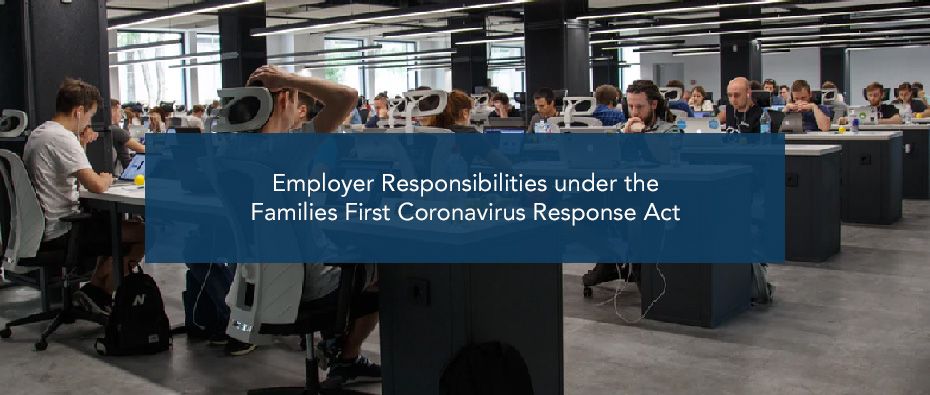Employer Responsibilities under the Families First Coronavirus Response Act
What are an employer’s responsibilities under the Families First Coronavirus Response Act?
Lydecker partners Richard Lydecker, Stephanie Pidermann, and Margaret Mevers explain below.
What is the Families First Coronavirus Response Act?
On March 25, 2020, the Department of Labor (“DOL”) issued guidance to the public to apprise employers of their responsibilities relating to paid sick leave and expanded family and medical leave under the Families First Coronavirus Response Act (“FFCRA”).
During these critical times, the FFCRA seeks to provide employees peace of mind via additional paid sick leave and further security through expanded family and medical leave for reasons specifically related to COVID-19. The below provisions take effect on April 1, 2020, and remain in force through December 31, 2020.
Does the FFCRA apply to my company?
The FFCRA imposes responsibilities upon private sector employers of companies with 500 employees or less and certain public sector employers. Eligible employees must have been employed for at least thirty (30) days before the date of any request for leave relating to COVID-19 under the FFCRA. Employees who are unable to work, including being unable to work from home, may seek paid leave under the FFCRA due to the following reasons:
- The employee is subject to a Federal, State, or local quarantine or isolation order related to COVID-19.
- The employee has been advised by a health care provider to self-quarantine related to COVID-19.
- The employee is experiencing COVID-19 symptoms and is seeking a medical diagnosis to confirm whether they have contracted COVID-19.
- The employee is caring for an individual subject to an order described in paragraph (1) above or an individual that is in self-quarantine as described in paragraph (2) above.
- The employee is caring for their child whose school or place of care is closed or unavailable due to reasons related to COVID-19.
- The employee is experiencing any other substantially similar condition specified by the United States Department of Health and Human Services.
What paid-leave entitlements are employers responsible for?
Employers who receive a request from an eligible employee for a qualifying reason listed above are required to provide up to two (2) weeks of paid sick leave. The amount of pay employers are obligated to provide is dependent on which of the above reasons are cited for the leave. Full-time employees are entitled to up to eighty (80) hours of paid leave, while part-time employees are entitled to two weeks of leave based on the average amount of hours they work in a given week (e.g., if the employee works twenty (20) hours each week, they are entitled to up to forty (40) hours of paid leave over a two-week period). The amount of paid leave that employers are required to expend is based on the higher of either the employee’s regular rate of pay or the applicable State or Federal minimum wage. Employees are entitled to paid leave at the following rates:
- 100% of their pay for qualifying reasons one (1) through (3) above; limited to $511.00 daily and $5,110.00 overall.
- 66.6 % of their pay for qualifying reasons four (4) and six (6) above; limited to $200.00 daily and $2,000.00 overall.
- Employees who cite qualifying reason five (5) above are entitled to up to twelve (12) weeks of paid sick leave and expanded family and medical leave paid at 66.6% of their pay; limited to limited to $200.00 daily and $2,000.00 overall.
**It should be noted, small businesses with fewer than 50 employees may qualify for exemption from the requirement to provide leave due to school closings or child care unavailability if the leave requirements would jeopardize the viability of the business as a going concern**
What penalties is my company subject to for non-compliance with the FFCRA?
Although no specific penalties have been outlined to date, the DOL’s Wage and Hour Division (“WHD”) has prohibited employers from discharging, disciplining, or otherwise discriminating against any employee who lawfully takes paid sick leave or expanded family and medical leave under the FFCRA. The WHD will impose penalties against employers for violations of the FFCRA. Additionally, employers who discriminate against their employees for the above-referenced reasons, or retaliate against their employees for choosing to avail themselves to their rights under the FFCRA, would potentially expose themselves to litigation and similar damages that would otherwise be available pursuant to the Family Medical Leave Act.
What steps should my company take next?
Given the swift nature of COVID-19 and the rapid response that the United States government is effectuating daily, it is important to equip your company with experienced counsel to assist you in navigating through these tumultuous times.
Lydecker’s labor and employment group has decades of combined legal experience in litigation and transactional matters. Time and time again, Lydecker has prevailed in employment litigation matters through trial and has counseled employers in labor matters to provide economic and efficient solutions to prevent litigation from ensuing and ensure compliance with State and Federal regulations.
For more information, contact our professionals below:
Richard Lydecker, Senior Partner
rl@lydecker.com
305-416-3180
Stephanie Pidermann, Partner
sp@lydeckder.com
305-416-3180
Margaret Mevers, Partner
mhm@lydecker.com
305-416-3180






